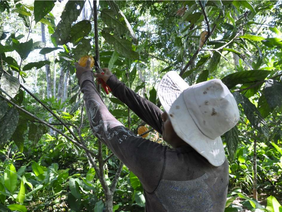The new Organic Regulation (EU) 2018/848 introduces significant changes to organic imports, aiming to enhance organic integrity. From 1 January 2025, organic imports from most third countries—except those recognized as equivalent by the EU and Switzerland—must fully "comply" with EU rules. Audits to verify compliance have only recently begun, so most 2024 certificates remain under the previous system of "equivalence". These certificates will be accepted only under specific conditions and no later than 15 October 2025.
The regulation defines new rules for certification of smallholder farmers as a "group of operators". This has consequences for around 1800-2000 producer groups with about 1 million small-scale producers in not-recognized third countries, which are estimated to currently supply the European market. The changes will impact a wide range of organic products as coffee, cocoa, rice, spices, bananas, coconut products, dried fruits and nuts.
More consistent standards
The revised regulation promises benefits such as a harmonized framework that levels the playing field for all operators, promoting clearer and more consistent organic standards. For organic producer groups that can adapt to the new requirements, there is potential for enhanced market access and stronger consumer trust in the organic label. Many stakeholders, including 40 percent of surveyed third-country producers and traders, view this regulatory clarity as an opportunity to fortify organic practices and maintain quality.
Struggle for compliance
However, the study highlights serious concerns for smallholder farmers and export-oriented producer groups that may struggle to comply with the new EU requirements.
Key challenges include:
- Significant Organisational Changes: Approximately 70 percent of currently certified small producer groups must undergo organisational restructuring to meet the new Group of Operator rules. The involved legal and financial investments may be prohibitive.
- Market Accessibility: Many organic smallholder supply chains will struggle to adapt to the new Regulation. Due to rising costs and increasing complexity, it is likely that for some, the European organic market will no longer be attractive or they will lose their organic certification.
- Supply Disruptions: It is to be expected that there will be challenges in supply chains during the initial years, leading to limited product availability.
Recommendations for Support and Adaptation
To mitigate these impacts, the study recommends that policymakers, development organisations and the organic industry cooperate and provide support to ease the transition. Suggestions include:
- Organic traders in Europe are advised to support their smallholder value chains e.g. by training, information und adapted contracts.
- Training and advisory services: Tailored training and technical support services for producer groups, control bodies and local consultants are essential.
- Financial and legal assistance: Offering subsidies or support payments for initial investments and legal advise could help smallholder producer groups to adapt.
- Better understandable compilation of regulatory rules and training materials for organic production in third countries. Adjustments of selected requirements in the ongoing legislative process.
While the EU’s new regulation represents an important step for the credibility of organic standards, its impact on global smallholder communities will require attention and proactive measures to ensure that producers in developing markets can continue to participate in the European organic market.
Further information
Contacts
Links
orgprints.org: Report "Impact of the New EU Organic Regulation on Smallholder Value Chains and the European Organic Sector"




